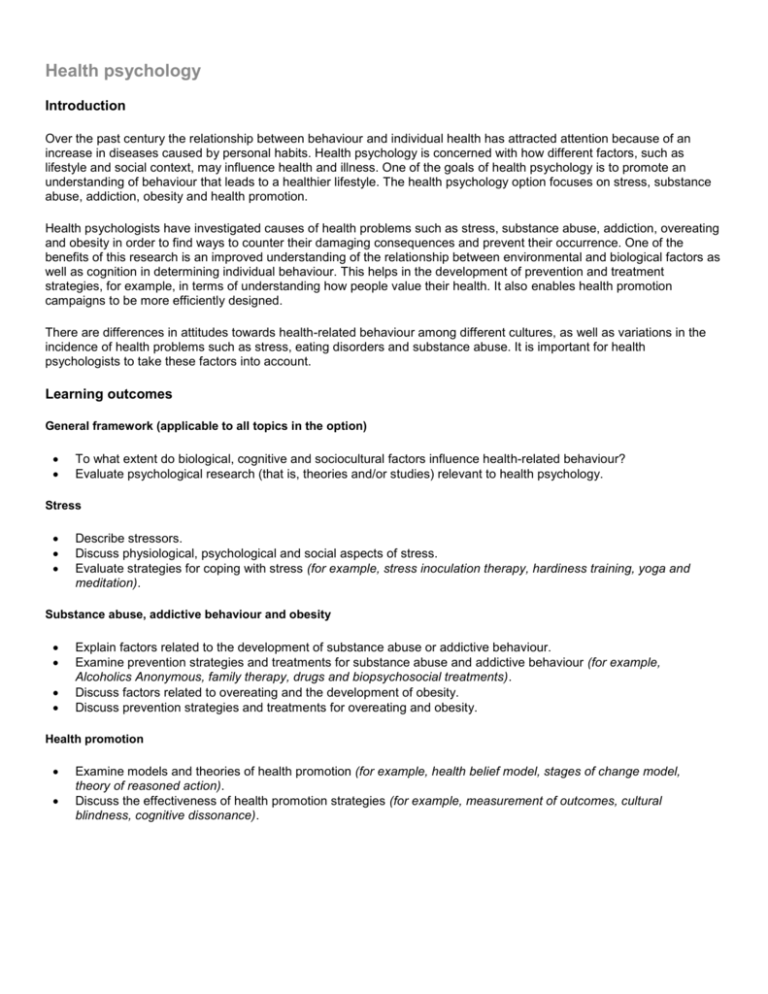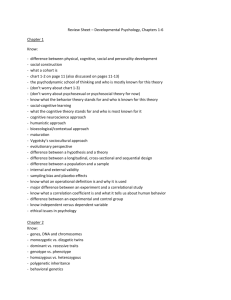options - Rehmibpsychology
advertisement

Health psychology Introduction Over the past century the relationship between behaviour and individual health has attracted attention because of an increase in diseases caused by personal habits. Health psychology is concerned with how different factors, such as lifestyle and social context, may influence health and illness. One of the goals of health psychology is to promote an understanding of behaviour that leads to a healthier lifestyle. The health psychology option focuses on stress, substance abuse, addiction, obesity and health promotion. Health psychologists have investigated causes of health problems such as stress, substance abuse, addiction, overeating and obesity in order to find ways to counter their damaging consequences and prevent their occurrence. One of the benefits of this research is an improved understanding of the relationship between environmental and biological factors as well as cognition in determining individual behaviour. This helps in the development of prevention and treatment strategies, for example, in terms of understanding how people value their health. It also enables health promotion campaigns to be more efficiently designed. There are differences in attitudes towards health-related behaviour among different cultures, as well as variations in the incidence of health problems such as stress, eating disorders and substance abuse. It is important for health psychologists to take these factors into account. Learning outcomes General framework (applicable to all topics in the option) To what extent do biological, cognitive and sociocultural factors influence health-related behaviour? Evaluate psychological research (that is, theories and/or studies) relevant to health psychology. Stress Describe stressors. Discuss physiological, psychological and social aspects of stress. Evaluate strategies for coping with stress (for example, stress inoculation therapy, hardiness training, yoga and meditation). Substance abuse, addictive behaviour and obesity Explain factors related to the development of substance abuse or addictive behaviour. Examine prevention strategies and treatments for substance abuse and addictive behaviour (for example, Alcoholics Anonymous, family therapy, drugs and biopsychosocial treatments). Discuss factors related to overeating and the development of obesity. Discuss prevention strategies and treatments for overeating and obesity. Health promotion Examine models and theories of health promotion (for example, health belief model, stages of change model, theory of reasoned action). Discuss the effectiveness of health promotion strategies (for example, measurement of outcomes, cultural blindness, cognitive dissonance). Psychology of human relationships Introduction This social psychology option focuses on human relationships; these relationships may be romantic, friendship, familial, or antagonistic. Humans are social animals, but while we depend upon others for our well-being, conflict with others can threaten our survival individually and as social groups. Key goals of social psychologists are to understand the complexities of relationships, improve interpersonal relationships, promote social responsibility and reduce violence. Psychologists assume that we may actively change our environment and not simply be manipulated by it. Violence is defined here as a specific aspect of aggression characterized by victimization of another (for example, bullying, domestic violence, genocide). Though much of the research on aggression may be used to understand the basis of violence, the focus of this part of the option is to apply this research to social problems in which violence is often manifested. One approach to the study of human relationships concentrates on the role of hormones and genetics. However, this gives a limited understanding of how relationships develop. Cognitive theorists have contributed to the understanding of relationships by applying schema theory, whereas social psychologists have focused on attribution theory, social identity theory and the role of culture. Studying human relationships, however, has its challenges. It is tempting to oversimplify complex social issues or misdirect the blame for problems. When studying human relationships psychologists must also be concerned about the objectivity of the researcher, the right to privacy of the individual and the temptation of social engineering. Learning outcomes General framework (applicable to all topics in the option) To what extent do biological, cognitive and sociocultural factors influence human relationships? Evaluate psychological research (that is, theories and/or studies) relevant to the study of human relationships. Social responsibility Distinguish between altruism and prosocial behaviour. Contrast two theories explaining altruism in humans. Using one or more research studies, explain cross-cultural differences in prosocial behaviour. Examine factors influencing bystanderism. Interpersonal relationships Examine biological, psychological and social origins of attraction. Discuss the role of communication in maintaining relationships. Explain the role that culture plays in the formation and maintenance of relationships. Analyse why relationships may change or end. Violence Evaluate sociocultural explanations of the origins of violence. Discuss the relative effectiveness of two strategies for reducing violence. Discuss the effects of short-term and long-term exposure to violence. Sport psychology Introduction Sport psychology is the scientific study of the behaviour of individuals in sport contexts, including both individual and social aspects of behaviour. Participation in sport is increasingly recognized to be of value in many cultures because of the contribution of sport to health and well-being. Participation in sport also serves to enhance international cooperation through competitions, thereby acting as a platform for communication and cross-cultural understanding. This option addresses cognitive, sociocultural and biological aspects of sport psychology. The biological level of analysis is used in arousal theories. The cognitive level of analysis is used in the investigation of topics such as goal-setting and motivation. The sociocultural level of analysis is applied to team cohesion and the motivation of individuals. Controversies related to areas of sport psychology are the issues of overtraining, burnout, and the way in which individuals and coaches deal with injuries. Learning outcomes General framework (applicable to all topics in the option) To what extent do biological, cognitive and sociocultural factors influence behaviour in sport? Evaluate psychological research (that is, theories and/or studies) relevant to the study of sport psychology. Emotion and motivation Evaluate theories of motivation in sport (for example, cognitive-evaluation theory, achievement goal theory, self-efficacy theory). Using one or more research studies, explain the role of goal-setting in the motivation of individuals. Discuss theories relating arousal and anxiety to performance (for example, optimal arousal theory/inverted U hypothesis, drive theory, reversal theory). Skill development and performance Evaluate techniques for skill development used in sport (for example, repetition, mental imagery, attention control/concentration training). To what extent does the role of coaches affect individual or team behaviour in sport? Explain relationships between team cohesion and performance. Describe aids and barriers to team cohesion. Problems in sports Discuss athlete response to stress and chronic injury (for example, stress-based model, grief reaction response, relaxation techniques). Examine reasons for using drugs in sport. Discuss effects of drug use in sport. Compare models of causes and prevention of burnout (for example, cognitive-affective stress model, negative training stress model, investment model). Developmental psychology Introduction Developmental psychology is the study of how and why people change over time in the way they behave, think, and relate to others. Developmental psychology focuses on developmental themes such as identity, attachment and adolescence. It is important to gain an understanding of the extent to which early experience may influence later development and if there are critical periods in development. Knowledge about the influence of biological, social and cultural factors in people’s lives is helpful not only for families but also in childcare and education to create good opportunities for children and young people all over the world. Controversies related to developmental psychology include the extent of the impact of early experiences and why some children seem to be more resilient than others after stressful experiences in childhood. In recent years knowledge about resilience has been used to develop programmes that can increase resilience. Learning outcomes General framework (applicable to all topics in the option) To what extent do biological, cognitive and sociocultural factors influence human development? Evaluate psychological research (that is, theories and/or studies) relevant to developmental psychology. Cognitive development Evaluate theories of cognitive development (for example, Piaget, Bruner, Vygotsky, brain development theories). Discuss how social and environmental variables (for example, parenting, educational environment, poverty, diet) may affect cognitive development. Social development Examine attachment in childhood and its role in the subsequent formation of relationships. Discuss potential effects of deprivation or trauma in childhood on later development. Define resilience. Discuss strategies to build resilience. Identity development Discuss the formation and development of gender roles. Explain cultural variations in gender roles. Describe adolescence. Discuss the relationship between physical change and development of identity during adolescence. Examine psychological research into adolescence (for example, Erikson’s identity crisis, Marcia). Cognitive level of analysis Introduction At the second level of analysis, the products of our biological machinery can be seen in our cognitive system, which includes our cognitions, emotions and behaviours. Around the 1950s psychologists began systematically to explore cognition to further understanding of human behaviour. This shift in focus from studying observable behaviour to studying mental processes, such as memory and perception, is called “the cognitive revolution”. Cognitive psychologists suggested that humans form internal mental representations that guide behaviour, and they developed a range of research methods to study these. In recent years, researchers within social and cultural psychology have used findings from cognitive psychologists to understand how mental processes may be influenced by social and cultural factors. Cognitive psychology represents a vast array of research areas including cognitive psychology, cognitive science, cognitive neuropsychology and cognitive neuroscience. Topics such as memory, perception, artificial intelligence, amnesia and social cognition are studied. Cognitive psychologists use traditional research methods (for example, experiments and verbal protocols) but there is an increasing focus on the use of modern technology. Cognitive psychologists collaborate increasingly with neuroscientists, social psychologists and cultural psychologists in order to explore the complexity of human cognition. This approach is illustrated in the field of cultural and social cognitive neuroscience, indicating the complementary nature of social, cognitive and biological levels of analysis. Research that integrates these three levels can develop more meaningful theories to explain the mechanisms underlying complex behaviour and the mind. Learning outcomes General learning outcomes Outline principles that define the cognitive level of analysis (for example, mental representations guide behaviour, mental processes can be scientifically investigated). Explain how principles that define the cognitive level of analysis may be demonstrated in research (that is, theories and/or studies). Discuss how and why particular research methods are used at the cognitive level of analysis (for example, experiments, observations, interviews). Discuss ethical considerations related to research studies at the cognitive level of analysis. Cognitive processes Evaluate schema theory with reference to research studies. Evaluate two models or theories of one cognitive process (for example, memory, perception, language, decision-making) with reference to research studies. Explain how biological factors may affect one cognitive process (for example, Alzheimer’s disease, brain damage, sleep deprivation). Discuss how social or cultural factors affect one cognitive process (for example, education, carpentered-world hypothesis, effect of video games on attention). With reference to relevant research studies, to what extent is one cognitive process reliable (for example, reconstructive memory, perception/visual illusions, decision-making/heuristics)? Discuss the use of technology in investigating cognitive processes (for example, MRI (magnetic resonance imaging) scans in memory research, fMRI scans in decision-making research). Cognition and emotion To what extent do cognitive and biological factors interact in emotion (for example, two factor theory, arousal theory, Lazarus’ theory of appraisal)? Evaluate one theory of how emotion may affect one cognitive process (for example, state-dependent memory, flashbulb memory, affective filters).





